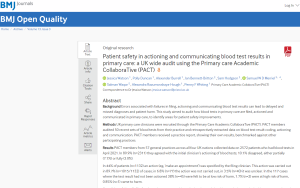Study shows how patient safety could be enhanced through blood test management
29 July 2024
Researchers from the University of Bristol and the Primary Care Academic Collaborative (PACT) reviewed how GPs action and communicate blood test results and found significant differences and gaps in how blood test results are managed in primary care across the UK. A new study published in BMJ Open Quality asked GPs from PACT to review the results of 2,572 patients who had had blood tests in April 2021.
The study explored how blood tests in primary care were filed, actioned and communicated, to identify areas where patient safety could be improved. The research team found that 89.9 per cent of clinicians reviewing blood test results during the study agreed with the actions the original clinician had taken, with 10.1 per cent disagreeing, either partially or fully.
However, they also found that using a collaborative model of research in primary care could stimulate positive change, with around 50 per cent of the practices that took part in the study, and completed a follow up questionnaire, using their results to stimulate quality improvement activities, practice learning, or educational activities within the practice.
Other key findings:
- Follow-through on actions: In 44 per cent of patients, specific actions such as making an appointment were recommended. This action was carried out in 89.7 per cent of cases. However, action was not taken in 6.8 per cent of patients and researchers couldn’t confirm if action was taken in 3.5 per cent of cases.
- Communication of test results: The study team found no evidence to document that test results were communicated to 47 per cent of patients. Among those with abnormal results, the study team found no evidence of communication in 30.6 per cent of patients.
- There were large differences between practices in rates of actioning and communicating test results.
Dr Jess Watson, a GP and NIHR Clinical Lecturer in General Practice at the Centre for Academic Primary Care, University of Bristol and lead author of the study, said:
“Over 100 million blood tests are ordered by GPs in England every year. Patients who have a blood test need to know what the results show and what to do next.
“Our findings suggest that whilst many practices have robust systems in place, there is scope for further quality improvement to ensure test results are communicated and actioned appropriately.”
“This study also has important implications for researchers, demonstrating the success of the PACT model, which opens up opportunities for future collaborative PACT research projects in primary care.”
The Primary Care Academic Collaborative (PACT)
PACT is a new UK-wide network of primary care health professionals from England, Wales, Scotland, and Northern Ireland, who collectively take part in primary care research and quality improvement (QI) projects that seek to improve patient care.
Paper



